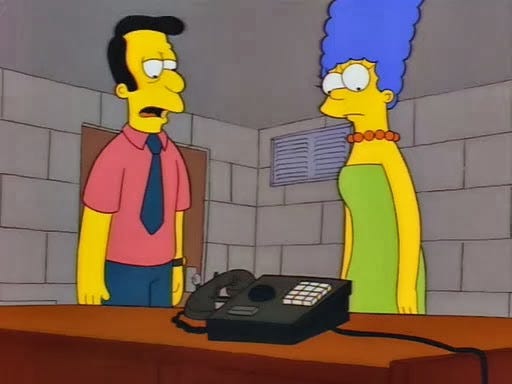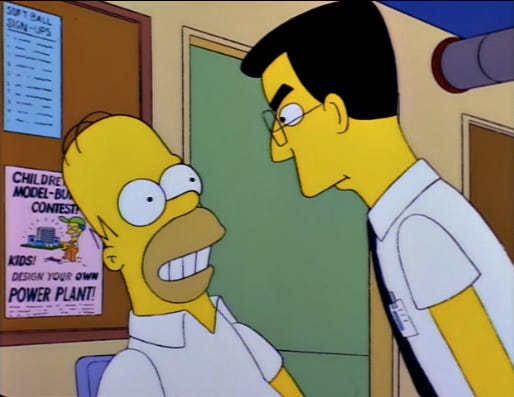Season 8, Episode 22
Aired April 27, 1997
Directed by Steven Dean Moore
Written by Donick Cary
Synopsis: It’s Sunday, and Bart and Lisa are trying to watch cartoons as quietly as possible without waking up their parents, but Itchy & Scratchy are too funny to make that happen. Marge promptly has the children get ready for church to their (and Homer’s) disappointment, but Marge remains steadfast in spending one hour a week at the lord’s house. As per usual, though, Reverend Lovejoy’s sermon turns out to be a dud and causes most of his patrons to fall asleep, but he remains dedicated to spreading his word. When the Simpsons return home, Marge notes how quickly Homer and the kids change out of their Sunday Best into their street clothes so they can race to the garbage dump, and laments that the Reverend’s sermon leaves no impact on them. She returns to the church and tries to talk to Lovejoy about his work, but he suggests that he’s too busy keeping up with the building’s demands to update his sermons and nudges at the need for an assistant. To his surprise, Marge accepts. We then see Homer, Bart and Lisa at the dump, where Bart finds something quite surprising among all of the junk- a Japanese dish soap container with a face that looks eerily like Homer’s. He’s freaked out, and the family take it home as they try to crack this puzzle. Back at the church, Marge does a fine job of cleaning it up, and the Reverend enjoys having her around as he studies the bible for the first time in ages. But Marge’s enthusiasm drops hard when she hears the Reverend give half-assed advice when Principal Skinner calls him up. Lovejoy admits that after years of handling Flanders’ bullshit, he eventually grew weary of helping others and seldom offers honest advice that doesn’t revolve around just skimming through the bible. Marge thinks that he should be willing to offer more to his people, so Lovejoy offers to let Marge take over his calls for him. Sure enough, Marge does a good job of handling everyone in town’s problems, and she soon becomes more popular at church than the Reverend, which causes him to get into a deep depression. Even the saints he looks up to tells Lovejoy that he hasn’t done a good enough job bringing his people’s attention to the book, which leads him to ignore the church and focus on his model train. Oh well, back to the detergent plot. It turns out that this box comes from a dish soap called Mr. Sparkle, which is quite popular in Japan and is a joint venture of two different companies, combining their logos of a smiling fish and light bulb to make a Homer-esq face. That solves that. Back to Marge, she takes a call from Lovejoy’s “favorite” client, as Ned worries when Jimbo and his friends loiter outside the Leftaorium. Marge suggests that Flanders tells them to skedaddle, which doesn’t go well at all. The kids are riding their minibikes across from Flanders and start chasing him outside of town. According to Maude, he never returned home that evening, which leads Marge to ask the Reverend for advice, and as soon as the two meet up, they receive a call from Flanders, who is stranded at a gas station while the boys are pumping up their minibikes. Marge recognizes where they are, and soon learn that they went to the zoo across the street. The good news is that Ned succeeded at running away from the boys, who head out. the bad news is that he’s trapped in the baboon pit, who are viciously trying to get their hands on him. Marge has no solution, but the Reverend jumps in, saves Ned, and has the two ride the zoo’s miniature train as they fight off the blood-hungry baboons. The episode ends with Lovejoy delivering an explosive sermon detailing his rescue of Flanders in exciting detail.
The Simpsons has had a long-standing take on religion that basically comes down to “it’s all baloney, unless… lol, jk jk but what if…”, and it’s a take that has done good things for the show over the years. For one, it allowed us the image of God sitting down with Homer and lament about how he’d rather watch the game than deal with all of our problems.
For another, we’ve been gifted the character of Reverend Tim Lovejoy, an apathetic paster whose faith is still strong, but has lost virtually all traces of empathy and interest in his fellow man after years of petty mediocrity. While his wife, Helen, has arguably had more development over the years, he’s remained an entertaining figure throughout, and it’s about time that he receives the spotlight for a change.
However, it turns out that after offering a generation’s worth of apathy, any attempt at sincerity is appreciated in comparison, which is why Marge’s tenure as a call lady goes over so well.
It’s interesting to see how the character of Reverend Tim Lovejoy has changed over the years, turning a God-fearing but indifferent server into the kind of religious nutjob you’d expect to see Flanders represent as in later seasons, but it does feel inevitable. Edges and subtlety get lost over 30 years of storytelling, but we’re at a point where Lovejoy isn’t as over-exposed as to find a way to make him seem different, and if that involves having him back away from his people to work on his model train, then so be it.
While Marge and Lovejoy drive “In Marge We Trust”, the Mr. Sparkle sequence is a favorite, one that contains American-Japanese actors Sab Shimono and Karen Maruyama, while the factory worker who talks to Homer is voiced by Gedde Watanabe, aka Sixteen Candles’ Long Duck Dong. They do fine jobs even as they push a tired cliche in western media, of wacky Asian inventions. Still, I can see the appeal of the Mr. Sparkle dish soap and Homer’s kawaii face, and I bet it must have sold many a shirt back in the day.
This is Donick Cary’s first screenplay for the series, who will remain a regular writer through the tenth season. He does a fine job with his first grasp at the characters, even if Marge is arguably more passive than active in her role.
Still, a solid first effort, one that manages to make both Marge and Lovejoy’s characters feel a little richer, even if it’s just for the moment. Sometimes that, and a train ride, is all you need.
Season 8, Episode 23
Aired May 4, 1997
Directed by Jim Reardon
Written by John Swartzwelder
Synopsis: Mr. Burns sees an inspiring story about Frank Grimes, who earned a degree in nuclear science after a very rough life, and insists on hiring him at the power plant. Grimes moves into the same sector as Homer, and is instantly turned off by his lazy attitude and incompetence. When asking Lenny and Carl for reassurance that he isn’t crazy, they shrug and stand up for Homer. Things come to a head when Homer almost drinks a bottle of acid, which Grimes throws onto the wall, and catches the ire of Burns. From this point on, Homer is Grimes’ enemy, but that doesn’t sit well with our man, who demands to be loved at all times by everyone. Moe suggests that he invites Frank over to dinner, but this only backfires, as he’s turned off by the (relative) extravagance of the Simpson household, including Homer’s family and his wild, epic previous escapades. Grimes calls Homer a fraud and says that he doesn’t deserve the life he lives, which hurts. Homer can’t even drive to work the next day, until Marge convinces him to try his hand at being professional. Frank sees right through Homer’s façade, but his cries to Lenny and Carl fall on deaf ears. Instead, Grimes decides to call Homer’s bluff and takes an ad for the company’s contest for children to create a diorama of a clean, suitable future power plant. Grimes hopes that this gives Homer the perfect opportunity to prove how nonsensical he is, by entering a contest for children, but it backfires when his half-assed design wins, receives the approval of Burns, and earns a standing ovation from the audience. This causes Grimes to snap, who runs around the plant and wrecks havoc in the name of Homer Simpson. This ends when he grabs an electrical outlet with his bare hands, which naturally electrocutes him to death. The episode ends with everyone at Frank’s funeral, where Homer receives a laugh from the crowd as he falls asleep and mouths off, as Grimes’ grave rolls down ungracefully. Also during the episode, Bart wins a bid for an abandoned factory, and he hires Milhouse to keep up with it. By keep up, I mean raise hell, naturally. This experience ends when the factory crumbles into tiny pieces on Milhouse’s watch, because letting children run any kind of factory, busy or not, is a terrible idea.
In John Swartzwelder’s recent (if you consider a year and a half to be recent) interview with The New Yorker brings up an interesting perspective on one of his most famous episodes, particularly its unforgettable one-off character.
“Grimey was asking for it the whole episode. He didn’t approve of our Homer. He was asking for it, and he got it. Now what was this you were saying about heart?”
In case you think the episode or show sides with Frank Grimes, which is understandable but incorrect. Swartzwelder also compares writing Homer as if he was a big dog, and that seems to be the best way to handle the character, which I’d have to agree with. Not that dogs are dumb, necessarily, but that they’re loyal and are id-motivated over ego. Making Homer too dimwitted or self-centered can make the character harder to swallow, but finding room in his heart for his family and some kind of moral compass, even if he doesn’t always act with his best intentions, is why we come back to the character.
Even in this episode, where fish out of water Grimes responds negatively to Homer’s behavior, he’s arguably doing fine by the character’s standards, if a little dimwitted and not great at respecting boundaries. I think he genuinely wants to make nice with his new coworker, but it’s hard to root against Grimes, who speaks nothing but the truth about Homer.
The idea for the episode came about when asking how someone who isn’t accustomed to this world would react to a person like Homer, if they’d find him charming or unbearable. Realizing that the latter is more honest, and frankly, funnier, that’s the direction gone with Frank Grimes. Rather than casting a name into the role, Hank Azaria steps up to voice the character and gives some of the best work of his career, as his frustration towards Homer is palpable while remaining relatively charming and self-deprecating. Matched with a classic Castellaneta turn as Homer, and I think that the voice acting is generally impressive throughout.
It helps that the script is strong, even if it does take a dark turn near the end. The episode has divided viewers since its airdate for that reason, and while I get it, I stand by Swartzwelder’s take. I’m not sure if Grimey needed to die- frankly, it could have been fun to feature a character who holds genuine apathy towards Homer- but I stand by his script regardless. I think the episode is top-tier, and I always have.
Homer’s Bar Tab:
Couch Gar Wars: Vend-a-couch vs. Bart lighting up to the TV. I like how subtle the slap is in the latter.
$6.50 for root beer on a train sounds very modern.
“Did your husband come home last night? Well, mine didn’t.” Is a power move, but I can’t tell what kind of power. I appreciate Maude’s brutal honesty, though.
I wonder if you can get a Nitzi license plate like you can for Bort.
“So, this is my life. At least I’m doing better than dad.” Damn, Milhouse.
Next Week: We finish season 8 with a showcase for canceled spin-offs, and Bart going to military school… with Lisa?




